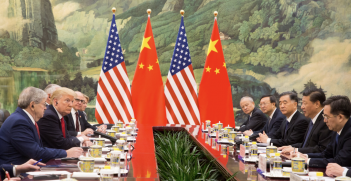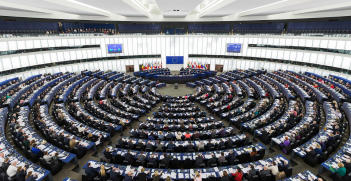Protests in China, Immigration Turmoil in Italy, and EUROPOL for Russia

Wide-spread protests in China have threatened to rupture Beijing’s carefully choreographed image. Meanwhile, Immigration troubles have returned to upset Franco-Italian relations.
For 72 hours during the past week headline writers and broadcast newsreaders have been excited by widespread demonstrations and protests across China, demanding an end to the national policy of COVID-19 lockdowns. In some parts of the country, notably Shanghai, there were calls for President Xi Jinping to step down – this just weeks after he had increased his grip on power to the point where he was described as “president for life.”
The police were, of course, out in force with plenty of arrests. The media described it as the biggest anti-government protest since the Tiananmen Square massacre of 1989 when tanks rolled in and slaughtered thousands. But by the start of this week the Beijing government had reaffirmed its zero-tolerance policy towards COVID-19, although it did call in regional health authorities for discussion and there are signs that they will attempt to increase vaccination rates, especially among the elderly. The stock market took the protests in its stride although there are fears that the Chinese economy is continuing to slow, with growth below five percent a year, and there is concern over falling property prices.
Meanwhile, Mr Xi has other business on his mind, notably his third summit with another world leader within as many weeks. This time it was the visit to Beijing of Charles Michel, the president of the European Union, an occasion which should throw some light on whether the bloc is really prepared to respond to American pressure to take a tougher line on trade with China. Many, if not most, of the EU’s 27 members are concerned the bloc is soft on an increasingly aggressive China, particularly its failure to publicly condemn Russia’s war on Ukraine. I understand Mr Michel will represent their concerns but, at what is bound to be a red-carpet occasion, he will also stress the need to keep lines of communication open.
Michel and his team will be heavily distracted by events going on back in Europe. First, the EU has announced it is to finance a team to go to Ukraine and assemble evidence so that it can prosecute Russia’s president Vladimir Putin for war crimes, the first time the European Commission has ever been involved in such a move. Secondly, it’s police agency EUROPOL has launched a new operation targeting criminal assets owned by individuals and legal entities that have been sanctioned in relation to the Russian invasion of Ukraine. The operation, known as Oscar, would conduct a widespread sweep through all 27 countries in the bloc. But the biggest debate now going on in Europe is over demands from Italy’s new nationalist prime minister Giorgia Meloni for help to stop the increasing flow of migrants into Italy. She has claimed that more than 90,000 have arrived at Italian ports to date this year, mostly from Libya but also from ports in Turkey and elsewhere in north Africa.
A major row has broken out between Meloni and the French government over her refusal to allow migrants rescued by a French boat to land in Italy, despite a European Union directive that those rescued at sea should be taken to the nearest safe place. The row intensified when Meloni refused to allow Ocean Viking, a migrant rescue vessel, to disembark some of those it had rescued, forcing it to take them to Marseille in southern France. Paris publicly condemned Italy for failing to abide by its humanitarian obligations to take people rescued at sea.
Back in China, it is unlikely that the Xi – Michel meeting will achieve any breakthrough. Mr Xi’s surveillance squads are still going through and updating the files of dissenters and protestors, with the government also determined to try and beat COVID-19. It is unlikely there will be time to discuss any of the more substantive issues worrying the Europeans, notably the expansion of China into the Polar regions of the Arctic and Antarctica. I doubt whether Michel will be saucy enough to ask the Chinese leader if he will be sending a present to Finland of two pandas, as he did last year.
Although the Polar icecap is more than a thousand miles from its nearest point to China, Beijing has made no secret of its interest in acquiring land and resources in the Arctic. It sees the region as another buckle in its Belt and Road Initiative – a proposed Beijing-led second link-up between Europe and Asia containing roads, airports, seaports, railways, pipelines, data centres, and broadband cables. China is on the record as saying it wishes to be a “Polar great power,” and appears to have gone about this intention carefully and methodically, including sending in vessels to the region’s sovereign states – Canada, Denmark, Finland, Iceland, Russia, Sweden, and the United States – and setting up scientific units in and around each of them. China describes the Arctic as one of the world’s “new strategic frontiers,” ripe for rivalry and extraction; it regards the area – and this goes for Antarctica too – as ungoverned or under-governed in terms of land, sea, and airspace.
Several European countries, notably Denmark and Britain, which is no longer in the European Union but is a trustee of both Polar regions, would challenge this. So, one imagines, will Australia. But it is clear this is going to be a big debate in the near future.
Colin Chapman FAIIA is editor-at-large of Australian Outlook and a fellow of the Australian Institute of International Affairs. He was president of AIIA New South Wales. Colin is a writer, broadcaster, and public speaker who specialises in geopolitics, international economics, and global media issues. He has held executive positions at the BBC and Financial Times.
This article is published under a Creative Commons Licence and may be republished with attribution.





